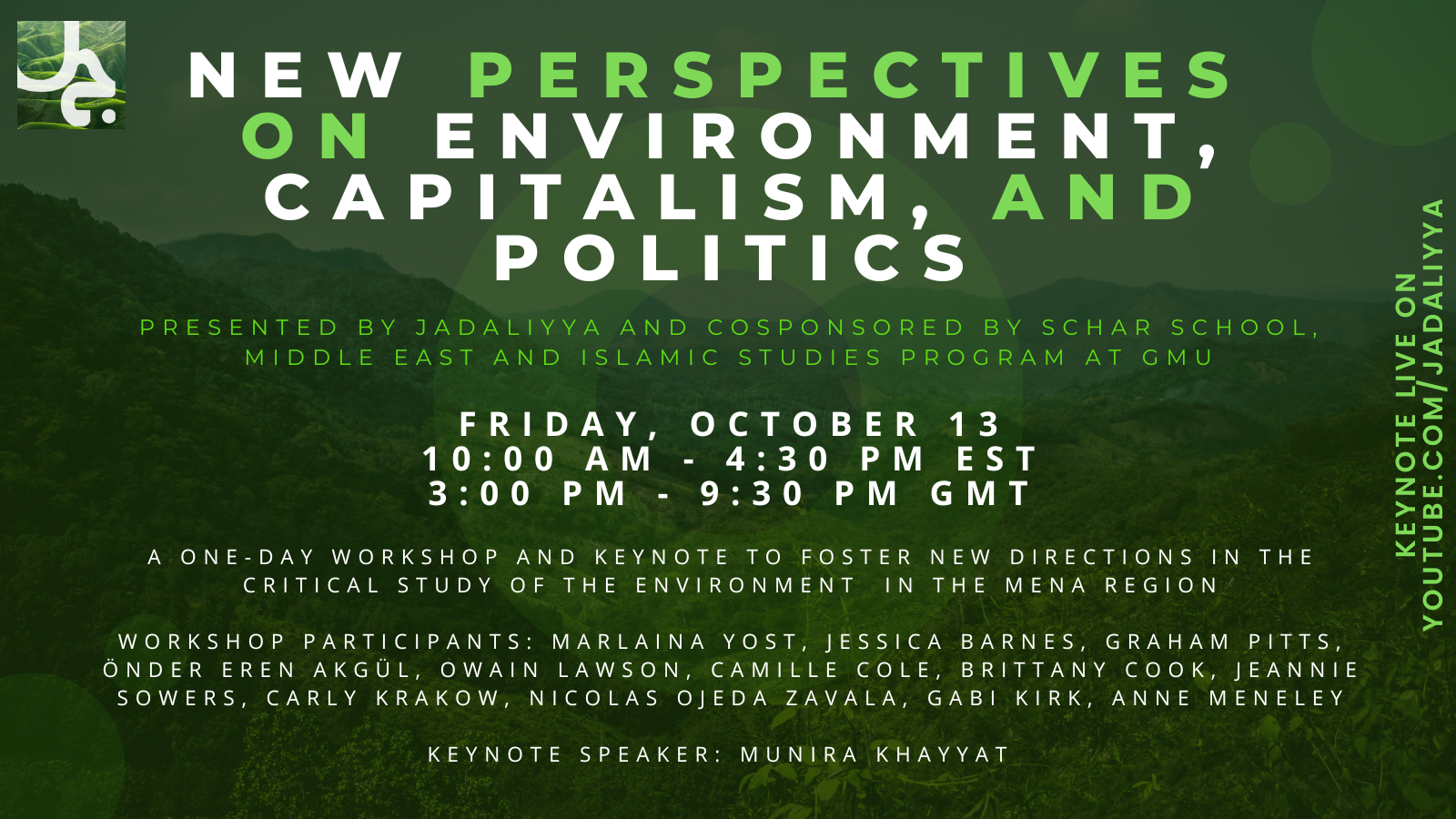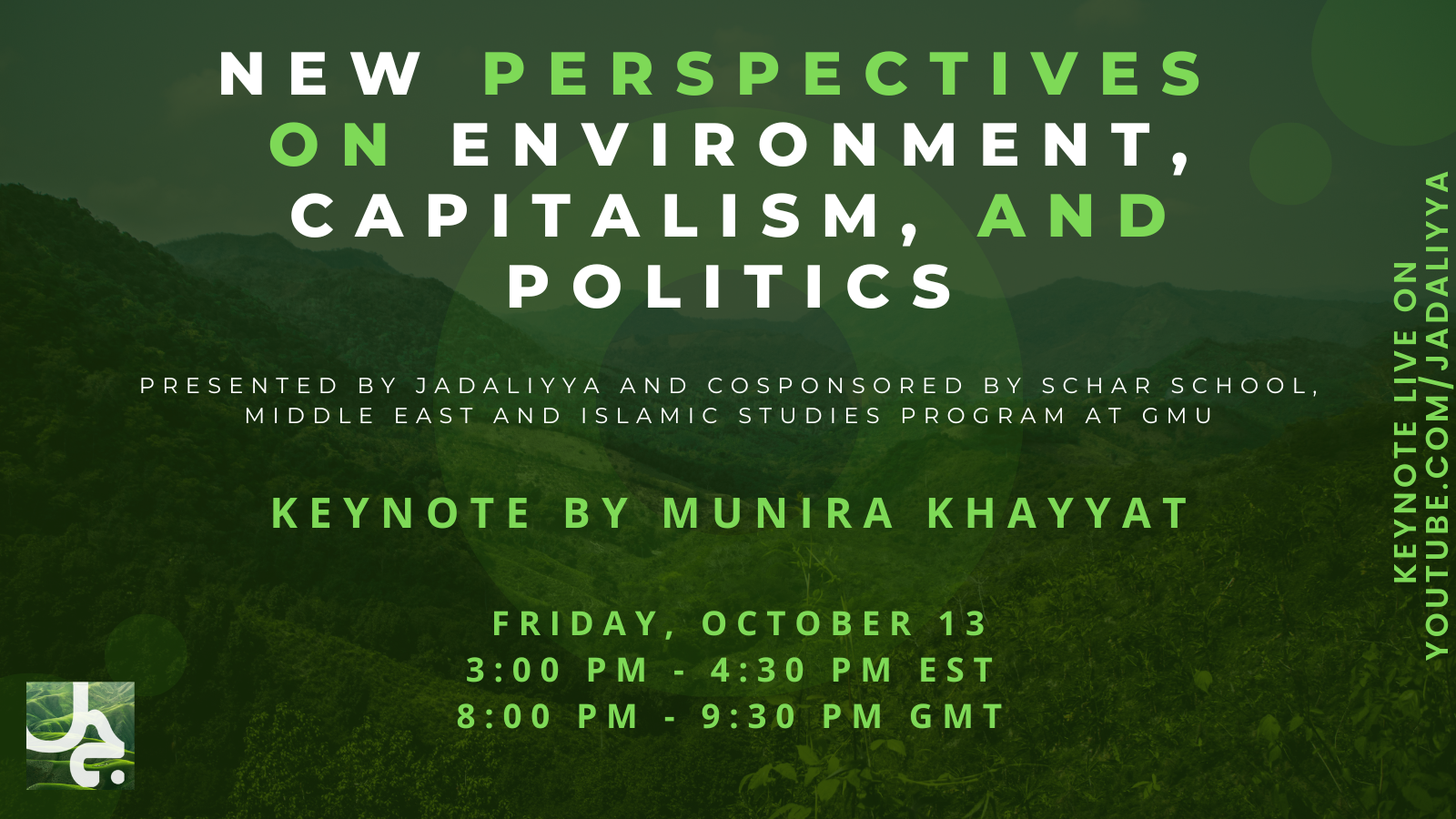Jadaliyya Environment Page
New Perspectives on Environment, Capitalism, and Politics
A one-day workshop and keynote to foster new directions in the critical study of the environment in the MENA region
Friday, 13 October 2023
10:00 AM - 4:30 PM EST | 3:00 PM - 9:30 PM GMT
Presented by Jadaliyya and Cosponsored by the Schar School of Policy and Governance at GMU, Middle East Islamic Studies at GMU
This one-day workshop and public-facing keynote fosters new directions in the critical study of the environment in the Middle East and North Africa. While climate change is one of the most pressing issues of our time, these regions remain marginal to most discussions on it. Worse still, emerging discussions on climate in the MENA are rejuvenating dangerous and reductive Orientalist tropes. This workshop brings together scholars whose work challenges simplistic narratives about environment and politics, with shared concerns for capitalism’s ecological dimensions. The workshop will allow scholars to present work-in-progress from multiple disciplines all focusing on the themes of climate, capitalism, and politics in the MENA, with feedback from discussants and group commentary. The public facing keynote held through the Arab Studies Institute on Zoom and recorded for publication on Jadaliyya will facilitate a discussion challenging a common climate change myth or misconception, such as conflict and climate change, climate reductionism, and land-grabbing under ‘green energy’ development. The workshop will facilitate the publication of new written work from the authors on climate change, capitalism and politics, and the keynote recording will serve as a pedagogic tool for introducing critical perspectives on these urgent questions.
Workshop Participants
Marlaina Yost
Jessica Barnes
Graham Pitts
Önger Eren Akgül
Owain Lawson
Camille Cole
Brittany Cook
Jeannie Sowers
Carly Krakow
Nicolas Ojeda Zavala
Gabi Kirk
Anne Meneley
Keynote Speaker
Munira Khayyat
Workshop Schedule
10:00 AM – 10:05 AM EST | Opening Remarks
Marlaina Yost & Camille Cole
10:05 AM – 10:45 AM EST | The Little America of Africa: Selecting Model Farmers at Zeidab, Sudan, 1903-1909
Marlaina Yost
Discussant: Jessica Barnes
10:45 AM – 11:25 AM EST | Lebanon in the Capitalist Web of Life
Graham Pitts
Discussant: Önder Eren Akgül
11:25 AM – 12:05 PM EST | Vernacular Development: Water, Technology, and Environmental Justice in Postcolonial Lebanon
Owain Lawson
Discussant: Camille Cole
12:05 PM – 12:35 PM EST | Break
12:35 PM – 1:15 PM EST | Racial Capitalism of Climate Famine Logics
Brittany Cook
Discussant: Jeannie Sowers
1:15 PM – 1:55 PM EST | Toxic Saturation, Climate Justice, and International Law: Health and Environmental Destruction in Wartime and Beyond
Carly Krakow
Discussant: Nicolas Ojeda Zavala
1:55 PM – 2:35 PM EST | Seeds of a sovereign future
Gabi Kirk
Discussant: Anne Meneley
2:35 PM – 3:00 PM EST | Break
3:00 PM – 4:30 PM EST | Keynote
Munira Khayyat



